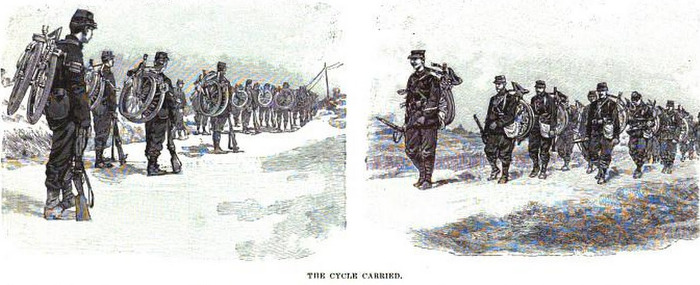Topic: Militaria
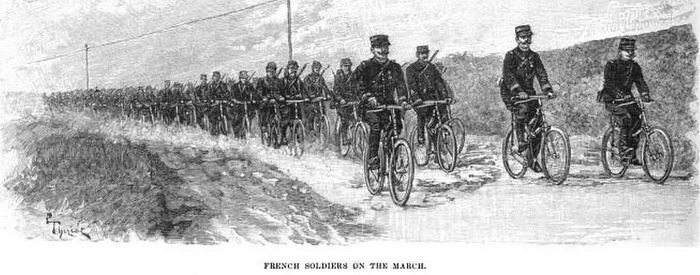
France Trails the Military Bicycle
The French tests of the Bicycle as a War Machine
Military Matters, The Gazette, Montreal, Quebec, 26 December 1896
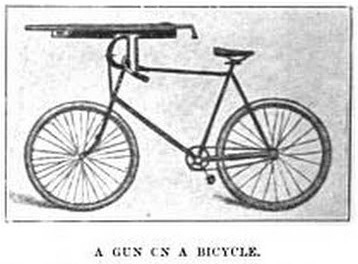 The serious consideration that France is giving the bicycle in connection with service in war, has led the military experts all over the civilized world to take up the matter, but as an admirable article in the London Daily Mail says: "Little has been done by any of the great Powers, although experts have long agreed that the bicycle will play an important part in the next war." But it is not the "faddy" or "ornamental" order with which the French have taken it up. Captain Gerard, a young officer of the French army, is proving by severe tests that bicycle corps can be trained to very nearly take the place of cavalry. He has been training his men to the performance known as the "cleaving of the Turk’s head" with the bicycle instead of the horse. It was found to be extremely difficult at first, and the slightest shifts in the saddle caused a spill. But the men soon acquired great proficiency, and demonstrated that the weight and impetus of the horse count as little, and that the feat is accomplished by strength and dexterity alone.
The serious consideration that France is giving the bicycle in connection with service in war, has led the military experts all over the civilized world to take up the matter, but as an admirable article in the London Daily Mail says: "Little has been done by any of the great Powers, although experts have long agreed that the bicycle will play an important part in the next war." But it is not the "faddy" or "ornamental" order with which the French have taken it up. Captain Gerard, a young officer of the French army, is proving by severe tests that bicycle corps can be trained to very nearly take the place of cavalry. He has been training his men to the performance known as the "cleaving of the Turk’s head" with the bicycle instead of the horse. It was found to be extremely difficult at first, and the slightest shifts in the saddle caused a spill. But the men soon acquired great proficiency, and demonstrated that the weight and impetus of the horse count as little, and that the feat is accomplished by strength and dexterity alone.
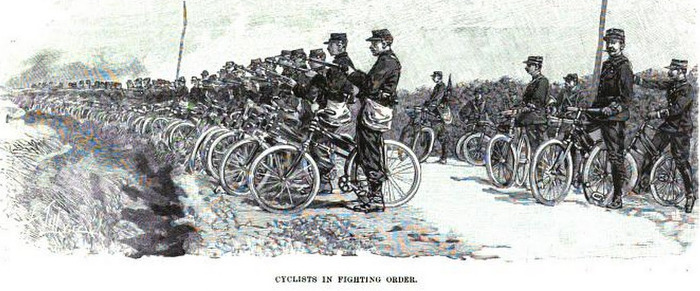
Rapid firing machine guns are carried on several types of machines, including tandems, double tricycles and the regular bicycle. On the regular safety the rapid-firing gun is fixed between the handles. It is an easy matter to perceive that a charge made by a couple of hundred men riding abreast and armed in this way would be more deadly than a charge of twice that number of cavalry. The tricycle, or military duplex safety, as it is called, is thought of favourably, for the reason that the space between the two rear wheels is well adapted to the carrying of ammunition. The gun is rigged on a crossbar between two saddles, and is easily manipulated by one of the riders. Another machine in use is a tandem fitted with two rapid fire guns.
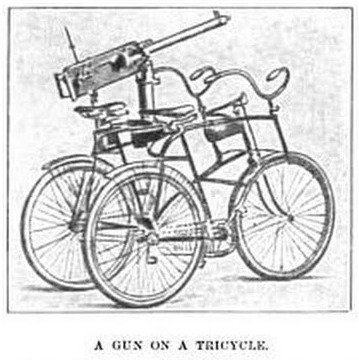 It is, however, in skirmishing that the bicycle promises most. A commander marching into an enemy’s country has had in times past to rely upon a corps of fleet horsemen to "feel the way" and follow the movements of the enemy. The extent of territory over which this could be done daily was limited by the powers of the horse. The bicycle skirmishers, however, would suffer under no such limitations. The transportation of fodder for the horses is one of the most serious problems that confront a military commander, and their care entails a vast amount of labour, which takes so many men out of the list of available fighters. Many times in history the approach of an enemy has become known by the tramping of the horses, which, upon a hard road, can be heard a long way off on a still night. Experienced campaigners have detected this ominous sound when the horses were miles away. Nothing of this kind would be possible. Again, a mounted horseman makes a large object at night, but a cyclist crouching low could only be seen with difficulty, and would make a very difficult target to hit. The tandem skirmishers are specially formidable. They have a speed which no horse can attain. In times of danger the rider in front can bend low and work the pedals while his companion can fire over his shoulder. Altogether the French officer in charge of the experiment has demonstrated to his own satisfaction the superiority of the bicycle over the horse for many purposes in warfare.
It is, however, in skirmishing that the bicycle promises most. A commander marching into an enemy’s country has had in times past to rely upon a corps of fleet horsemen to "feel the way" and follow the movements of the enemy. The extent of territory over which this could be done daily was limited by the powers of the horse. The bicycle skirmishers, however, would suffer under no such limitations. The transportation of fodder for the horses is one of the most serious problems that confront a military commander, and their care entails a vast amount of labour, which takes so many men out of the list of available fighters. Many times in history the approach of an enemy has become known by the tramping of the horses, which, upon a hard road, can be heard a long way off on a still night. Experienced campaigners have detected this ominous sound when the horses were miles away. Nothing of this kind would be possible. Again, a mounted horseman makes a large object at night, but a cyclist crouching low could only be seen with difficulty, and would make a very difficult target to hit. The tandem skirmishers are specially formidable. They have a speed which no horse can attain. In times of danger the rider in front can bend low and work the pedals while his companion can fire over his shoulder. Altogether the French officer in charge of the experiment has demonstrated to his own satisfaction the superiority of the bicycle over the horse for many purposes in warfare.
